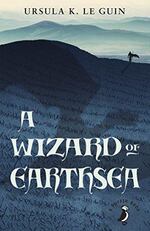Since the writer Ursula K. Le Guin died in January, fans have gathered at bookstores, libraries and other hubs to remember her. On Wednesday, June 13 the nonprofit Literary Arts hosts a tribute at the Arlene Schnitzer Concert Hall in Portland that fans worldwide can watch via webcast.
Of all the readers and writers inspired by Ursula Le Guin over the years — and there are many — people of color find some very specific touchstones in her work.

Edna Keller (right) and other staff at the Multnomah County Library's Capitol Hill branch.
April Baer / OPB
Edna Keller works at Multnomah County’s Capitol Hill branch library. She said the library gets a lot of overachieving young readers, going above and beyond grade level. If they ask her for a recommendation she can tell them about Le Guin’s thought-provoking interstellar novels — the Hainish Cycle masterpieces like “The Left Hand of Darkness” or “The Dispossessed.” But she’ll probably start them off with “A Wizard of Earthsea,” the tale of Ged, a boy who leaves behind his quiet rural life to learn spellcraft and face down his demons. Keller came across it when she was about 15, growing up in a small town in New Mexico.
Her town, Keller said, didn’t have the world’s greatest library. “But we have the world’s greatest librarian. And Ms. June said, ‘This might be a little bit old for you, or a little bit young, Edna — I don’t know — but you might want to try that.’”
Keller took the book down the dusty dirt road to her house and started reading.
“And that was one of the times Mommy dragged me out from underneath the bed with my flashlight, trying to read the book all night when she told me to go to bed,” she said.
Keller said Le Guin struck her as a writer who could really get at what people are about. That was extremely interesting to her as a teenager.
That was years ago. But today’s Ursula Le Guin readers get a strikingly similar experience to Keller’s. Akash Singh, now in his early 20s and a writer himself, spent his late elementary grades ripping ripping through novels in pursuit of free pizza for his school’s reading rewards program.
“My fifth grade English teacher was shoving ['Earthsea'] at me,” he remembered. “And I said, ‘I will read it! I have a list of 12 books I have to get through first!’ And she said, ‘No, you should read this first.’”
Singh said he was taken by Le Guin’s elegant prose and the main character’s ethnicity — Le Guin describes his red-brown skin. It felt like Le Guin was doing something unspoken, almost coded.
“I felt like she wanted you to know, and she understood why it was important and how it was important,” Singh said.
“A Wizard of Earthsea” set a new standard in Singh’s mind, for the balance between organic storytelling and intention. More recently, he’s been influenced by another Portland writer, Omar El-Akkad’s process in writing about a female protagonist.
Singh said it’s useful for all writers to apply some introspection to their process.
“Are you just doing that because that’s what authors today are held to?” he asked. “A greater question is, Why are you writing it this way? Why is your protagonist a female? What’s the greater point you’re trying to make with it? There’s so much fiction out there that doesn’t answer those basic questions.”

Ursula Le Guin opposed publishers or production companies who tried to recast characters as white, or downplay their ethnicity.
Courtesy of Puffin Books
Le Guin not only thought through those questions, she famously battled publishers and production companies who tried to represent Ged or other characters as white. She spoke truth to power in other ways, too, creating a high-functioning society based on principals of anarchy in "The Dispossessed" and introducing ideas about gender nonconformity in "The Left Hand of Darkness." Even so, her intentions stayed in balance with her craft.
Portland native Geneva Chao is a poet and fiction writer living in Los Angeles, who notes in “Earthsea,” Le Guin “dropped in race details very slowly. Just because Ursula isn’t ham-fisted and super-obvious in the way she puts things doesn’t mean we can’t recognize what she’s doing.”
Chao sees much implicit in Le Guin’s character decisions, choosing to see what other authors did not, and a broader understanding that fantasy world-building implies some responsibility on the part of the author.
“There were so many beautiful moments,” Chao said, “where she really encapsulated a moral consciousness. To me, that’s the most important part of her writing: It was intensely, intensely moral — which is not a very popular thing to say.” Still, Chao added, Le Guin herself certainly wasn’t shy about saying it.
The playbook Le Guin developed to guide her diverse characters might have been equally important. Some of Le Guin's white male peers like Robert Heinlein and Phillip K. Dick wrote science fiction reflecting militaristic and sexist overtones that stem from the classical and noir traditions that informed their work. But what's the point of assembling a universe full of exciting characters, if they're playing by the same old traditional rules that have guided a few thousand years of oppressive human civilization on Earth? Jelani Wilson writes and teaches at New Jersey City University.
“Speculative fiction doesn’t need to replicate,” said Jelani Wilson, who writes and teaches at New Jersey City University.
Wilson argues Le Guin got more mileage by assuming the future didn’t have to look like the past.
“It doesn’t need to reproduce our power dynamics," he said. "It doesn’t need to reproduce our dominant culture and our ideals. I think that speaks to something about the way that we imagine.”
There’s an assumption that writers can communicate politics or craft, but not both. As with other maxims, readers remember Le Guin for completely ignoring that one.
Leah Lakshmi Piepzna-Samarasinha is a writer and activist living between Seattle and Toronto. She said Le Guin’s stories like the anarchist classic “The Dispossesed” were hugely influential for her own writing and thinking, on their own merits, and by contrast with other, less deft speculative fiction.
“There are definitely some anarchist or feminist radical science fiction novels,” she said, “that are like being hit over the head with a sledgehammer. I could have read the back cover and it’d be better than reading the book. There’s a way in which her writing style [in “The Dispossessed”] reminds me of the ecosystem of Anarres: It’s very clear it’s very spare, but the storytelling and craft was incredible.”
She’s reminded of a quote from the speculative feminist great Marge Piercy: “She said, ‘There’s politics in every book.’ You could read some big, mainstream James Michener book and the politics are going to be in there too but nobody’s going to accuse them of writing a polemic.”
There will always be more to talk about. Piepzna-Samarasinha wishes for 20 more years with Le Guin. Could she have pushed further? An Ursula Le Guin writing novels today, she believes, would be writing in a completely different context. Would the daughter of anthropologist Alfred Kroeber, for example, have been willing to push further into how white culture infringed on indigenous people of the West?
But there's no doubt, Piepzna-Samarasinha said, Le Guin changed the container in which all writers now operate.
